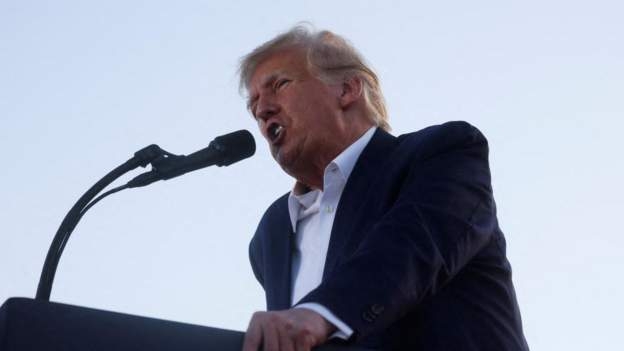Donald Trump's failed immunity appeal is still a win for his delay strategy
 Donald Trump
Donald Trump
Donald Trump has been handed a defeat in court - but one that comes with a generous helping of victory.
An appeals court ruled that Mr Trump is not immune from criminal prosecution for acts committed while he was president. The time it took to issue that decision, however, has indefinitely delayed Mr Trump's federal trial related to the 6 January 2021 attack on the US Capitol.
So while Mr Trump did not successfully assert sweeping new presidential powers to act with impunity while in office, the tentative 4 March start date in Washington DC has been removed from the federal court's calendar.
And there is no indication of when it might reappear.
This is in keeping with the former president's strategy of throwing sand in the gears of the judicial process whenever possible, according to Neama Rahmani, a former federal prosecutor.
"It's in Trump's interest to delay the case until after the November election," Mr Rahmani said. "If he wins control of the White House, a sitting president can't be prosecuted."
If delay is the goal, there are a few steps Mr Trump's legal team could now follow.
They might request that the full 11-judge DC Circuit Court of Appeals review and reconsider this case. That is unlikely to succeed, however, as six of the eight remaining judges would have to back that decision and obliging such a request is rare.
The appeals court, meanwhile, has ruled that the 6 January case can proceed while such a request is considered. Perhaps in the hope of avoiding further delay.
But Mr Trump has other options at his disposal.
He can turn to the Supreme Court, which would have to decide whether to review the case or let the lower-court decision stand. They can also decide whether to put the 6 January trial on hold in the meantime.
That appears the likely route, as the appeals court has given the Trump legal team until 12 February to prepare its Supreme Court request.
That is where there are further opportunities for delay or for the trial to get back on track.
If the Supreme Court refuses to hear the case, the election interference case could return to its normal schedule. But if it agrees to do so, that all but guarantees that a trial would take place under the shadow of election day - at the very earliest.
It is a prospect that may prompt Judge Tanya Chutkan, who is presiding over the trial, to shelve the case until Americans can cast their ballots in November.
Source: BBC
Trending World

Australia announces gun buyback scheme in wake of Bondi attack
14:26
EU agrees €90bn loan for Ukraine but without using Russian assets
14:24
Engineer becomes first wheelchair user to go to space
21:02
US carries out 'massive' strike against IS in Syria
20:52
Gunmen kill nine in South Africa tavern attack
17:54
Trump says US will keep or sell oil seized from Venezuela
17:32
Gunmen abduct 28 Muslim travellers in central Nigeria
16:01
US conducting surveillance flights over Nigeria after Trump intervention threat
04:25
UN experts urge Iran to stop execution of woman activist
17:30
US economy grows at fastest pace in two years
18:28




